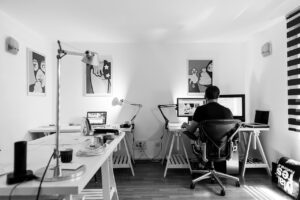Over the past decade, the idea of a “side hustle” has shifted from a hobbyist endeavor into a legitimate career strategy. With the rise of remote work, more people than ever are transforming freelance gigs, passion projects, and entrepreneurial experiments into full-time livelihoods. In 2025, remote work isn’t just changing where we work—it’s reshaping how careers are built from the ground up.
The Evolution of the Side Hustle
Historically, side hustles were seen as extra income sources—weekend crafts, online tutoring, or late-night content creation. But with the flexibility remote work offers, individuals can now nurture these projects with the same dedication and consistency as traditional jobs.
Cloud platforms, digital collaboration tools, and global marketplaces have eliminated many of the traditional barriers to starting a business or finding clients. As a result, side hustles are no longer confined to the margins—they’re entering the mainstream.
Flexibility Fuels Growth
Remote work creates an environment where experimentation thrives. Workers no longer need to choose between a stable job and their passion. They can test business models, develop skills, and build audiences in parallel with their main careers—all without commuting or relocating.
In many cases, the side hustle becomes more fulfilling or profitable than the primary job, prompting a career pivot. This flexibility is leading to a new wave of professionals who design their own career paths, driven by autonomy and purpose.
Case Studies: Real People, Real Shifts
- Lena, 29, Graphic Designer: Started freelancing on the side through platforms like Upwork. After two years of steady growth and client referrals, she turned it into a boutique remote design studio with two team members across different continents.
- Carlos, 35, Software Developer: Built a productivity app during evenings. Now runs a remote SaaS company full-time, supported by a network of remote contractors.
- Amira, 42, Marketing Specialist: Transitioned from a corporate job to offering consulting services online. She now hosts webinars and courses that generate more income than her old position.
These stories show that with remote infrastructure, career mobility is no longer linear or tied to traditional job titles.
Implications for the Workforce
Employers are noticing the shift. Many are beginning to accommodate dual roles, flexible hours, and part-time entrepreneurship within their teams. HR departments are rethinking benefits and career progression plans to retain talent that values autonomy and self-direction.
In parallel, educational institutions and training programs are focusing on skills that support independent work—such as project management, digital marketing, and online business development.
Looking Ahead
In 2025 and beyond, the line between “job” and “business” will continue to blur. As remote work becomes the norm, it will empower more people to redefine what success means on their own terms. Traditional careers may still exist, but they will increasingly coexist with a new model—where flexibility, creativity, and remote infrastructure pave the way for self-made success stories.




